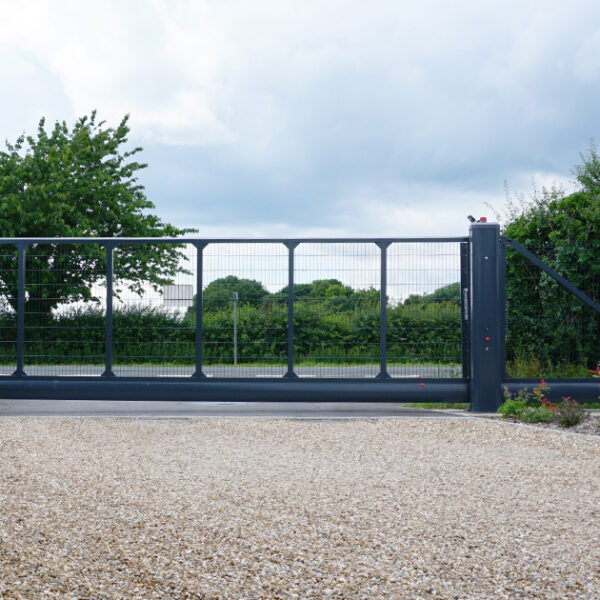In the UK, businesses are increasingly turning to cantilever gates as their preferred choice for secure and efficient site access. Whether managing a busy logistics hub, a large warehouse, or an industrial estate, these trackless sliding gates deliver reliability, safety, and long-term value.Unlike traditional swing or tracked gates, cantilever sliding gates offer smooth operation without needing a ground track. This makes them ideal for high-traffic environments where forklifts, lorries, and heavy vehicles move constantly.
Key Benefits of Cantilever Sliding Gates
No Ground Track – Minimal Disruption
Cantilever gates glide above the surface, meaning:- No ground track to clog with debris, ice, or gravel.
- No costly resurfacing during installation.
- Fewer long-term maintenance headaches compare to tracked sliding gates.
Space-Saving Design
Unlike swing gates, which need wide clearance, cantilever gates slide neatly along the fence line. This is invaluable for businesses where space efficiency is critical.Smooth & Quiet Operation
Built on a roller and counterbalance system, cantilever gates operate with less friction and noise, extending component lifespan and improving user experience, particularly useful in noise sensitive areas.High Security & Durability
Cantilever gates are harder to tamper with compared to ground-track gates. Their robust build supports advanced access control option, including:- Keypads, fobs, and card readers.
- Automatic Number Plate Recognition for vehicle access.
- Integration with CCTV and alarms.
Wide Openings for Industrial Traffic
These gates can span up to 10 metres or more without losing strength, making them ideal for HGV access and other heavy-duty commercial uses.Professional Appearance
A modern cantilever sliding gate not only protects but also enhances a company’s image, showing clients and partners that security and efficiency is prioritised.Trade Bodies & Safety Standards for Cantilever Gates
Choosing the right installer is just as important as the product itself. In the UK, automated gates fall under strict safety standards, and several key organisations ensure compliance:- Door & Hardware Federation - The DHF represents manufacturers, suppliers and installers of doors, gates and related hardware in the UK. It runs the industry Gate Safety campaign, publishes codes of practice for powered gates and barriers, and operates mandatory automated-gate training courses for member companies.
- Royal Society for the Prevention of Accidents - RoSPA endorses safer gate practice and has supported industry initiatives and guidance documents aimed at reducing gate-related accidents.
- Contractors Health & Safety Assessment Scheme - One of the UK’s leading health and safety prequalification schemes. If your gate installer is CHAS-accredited, it demonstrates compliance with core Health & Safety requirements and gives reassurance to commercial clients that contractors are independently verified.
- SafeContractor - A widely used Safety Schemes in Procurement accreditation. It proves that the contractor meets the recognised standards in health and safety management, risk assessments, and compliance which is valuable when hiring for high-risk environments such as logistics depots or utility sites.
- Construction Skills Certification Scheme - While primarily for individuals, CSCS cards are often required for gate installers working on construction or industrial sites. It proves that staff have the necessary training, competence, and awareness of health and safety risks on site.
- Institution of Occupational Safety & Health - IOSH membership or training (such as ISSH Managing Safely) is a strong indicator that installers and managers prioritise workplace safety.
How Often Should Cantilever Gates Be Serviced?
Like any piece of industrial equipment, cantilever gates require servicing (internal link) to maintain performance and safety compliance.Recommended Service Intervals:- Light use (occasional access): Once per year.
- Moderate use (daily business access): Every 6-12 months.
- Heavy use (logistics, 24/7 operations: Every 3-6 months.
